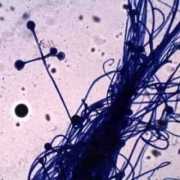Aflatoxicosis
Aspergillus fumigatus is a mold that is common in most soils. This species is usually involved in decay of plant materials. The mold commonly causes stored grains to heat and decay and, under certain conditions, invades grain in the field. The problem is serious world-wide where beans, corn, rice, peanuts, wheat, milk, eggs and meat are important in the human diet.
Mold sickness in animals (and humans) can be caused by or result from:
1. Allergic sensitivity to mold spores
2. Growth of pathogenic molds within the body
3. The effects of ingested or inhaled toxic compounds (mycotoxins) produced by molds
Mycotoxins have very real toxic side effects to plants, animals and humans. Aflatoxin B1 is one of the mycotoxins produced by A. fumigatus commonly found in grains. The name aflatoxin comes from A(Aspergillus) + FLA(flavus) + toxin. Research has shown that Aflatoxin B1 is the most potent naturally occurring carcinogen in animals.
Infection of crops is most common after the kernels have been damaged by unfavorable weather and/or insect damage. Aflatoxins persists under extreme environmental conditions and are even relatively heat stable at temperatures above 212 degrees F, the boiling point of water. This species is also resistant to very low temperatures.
Effects on Animals
Aflatoxins (mold poisons) are found in animals fed aflatoxin-contaminated feeds. Aflatoxicosis is the poisoning of animals (and humans) from the ingestion of aflatoxins in contaminated food. All animal species are susceptible to aflatoxicosis. Regular or occasional consumption of feed containing aflatoxins results in decreased feed consumption, poor feed conversion, stunting, and decreased flesh growth. Once the damage has been done, the animals will not fully recover, and this condition could possibly lead to death.
In addition to the direct effect of the aflatoxin, animals become more susceptible to other diseases because of reduced immunity. For example, in poultry, besides fatty liver and kidney disorders, muscle and bone problems can develop. Recently, the addition of binding agents such as edible bentonite, montmorillonite and zeolite (volcanic) clays and natural supplements to the diet decrease the effects of mycotoxins.
When fed to animals, these natural products provide nonspecific binding to the mycotoxins, reducing the passage time through the gut. Although not specifically approved for this purpose, various products that have this ability are approved as binding or anti-caking agents.
Effects on Farmers and Grain Handlers
Aflatoxins are present in the spores of Aspergillus. When corn is combined and unloaded at elevators or other transfer points, it generates considerable dust, and some of this dust may contain aflatoxins. Hazmat suits and heavy gloves should always be worn when handling obviously moldy grain.
Inhaling aflatoxin-contaminated dust is a health hazard to humans as well as animals. Pulmonary Aspergilloma is a disease that afflicts the lungs of people and animals who come in contact with contaminated dusts containing mold spores and hyphae. Aspergilloma is frequently associated with skin irritation, fever, sneezing, wheezing, breathlessness, cough, ulcers and anorexia.
Aspergillus not only affects grain handlers, but also affects people who eat products made from contaminated crops. In addition, the effects of aflatoxins are immumosuppressive, causing increased susceptibility to infectious diseases, especially in populations where people ingestion is chronic. Click here to read more about contaminated peanut butter and the dangers to children.








